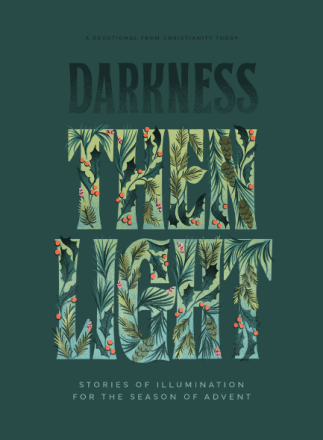Call it the “Christmas cloud”—that unwelcome shadow suspended over many in December. For the Christian, it’s hard to admit. Who wants to be the Grinch throwing cloud shade on Christ’s birthday? After all, “it’s the hap-, happiest season of all,” right? But for too many, happiness describes our songs, not our souls.
We feel emotionally exiled to the outdoors—peering through frosted windows at friends and families enjoying Christmas cheer. Inside is warmth and wonder. Outside, we’re wrapped in scarves of sadness. We wonder, God became man to save my soul—so why doesn’t that touch my happy place?
Christmas feels decidedly unmerry when our emotions don’t align with truth. No one told us life might include decking the halls while feeling dark, displaced, and shamelaced. We ask, Why does Christmas make me feel more alienated from the very things I know are good? How do I get out from under the cloud?
Start here: Christmas clouds don’t erase light.
Clouds may block the sun so we don’t see or feel its effects. But the sun’s power isn’t compromised. As a Floridian, I know this. We have two seasons: hurricane season and whatever you call the other six months. But even when storms loom, every Floridian knows the sun is still there. When entombed by ominous clouds, sunshine remains an unstoppable reality.
Same with Christmas. It’s not first a feeling; it’s a fact. “In him was life, and the life was the light of men. The light shines in the darkness, and the darkness has not overcome it” (John 1:4–5, ESV throughout).
The King of light invaded our darkness. He came as light-embodied and light-dispensing. “The true light, which gives light to everyone, was coming into the world” (v. 9). Christ was simultaneously light and lighter.
Don’t reduce Christmas to how you feel. I’m not saying ignore emotions—but don’t anchor your celebration to them. What makes Christmas merry isn’t your mood. It’s that Christ’s light is true. And he gave it to you.
Remember, you didn’t receive Christ as an ever-present emotion. You didn’t become a follower of a feeling. Something far greater happened. “God, who said, ‘Let light shine out of darkness,’ has shone in our hearts to give the light of the knowledge of the glory of God in the face of Jesus Christ” (2 Cor. 4:6). Beams of gospel light pierced your clouded heart. The cloud parted, if only for a moment. You responded to the gospel. The Light won.
So let Christmas remind you: When light and darkness clash, light wins. Every time. And if this Christmas feels too cloudy, reach back to the clarity of when Christ first came to you.
Also remember: Christmas clouds remind us we’re not home yet.
No holiday romances our imagination more than Christmas. But this isn’t heaven—not even close. Maybe your cloud points to something more holy: You’re homesick.
During Christmas, we’re pinged by a distant homeland. The season becomes God’s annual reminder that we’re not home yet. A new earth is ordered and on the way. Christmas incites longings to be whole with friends and family—to be fully known, forever loved, physically whole, and eternally safe. Christmas stirs an emotional foretaste of what will soon be fully satisfied. Proceed through the season “knowing that he who raised the Lord Jesus will raise us also with Jesus and bring us with you into his presence” (2 Cor. 4:14).
So don’t curse the Christmas cloud—let it direct your gaze. Christ has come. Christ is here. Christ will come again.
That’s not a feeling. That’s a fact bright enough to break through any cloud.
Dave Harvey (DMin, WTS) is the president of Great Commission Collective and serves on the board of Christian Counseling & Educational Foundation (CCEF). His most recent book is The Clay Pot Conspiracy: God’s Plan to Use Weakness in Leaders, and he writes regularly at Revdaveharvey.com.













